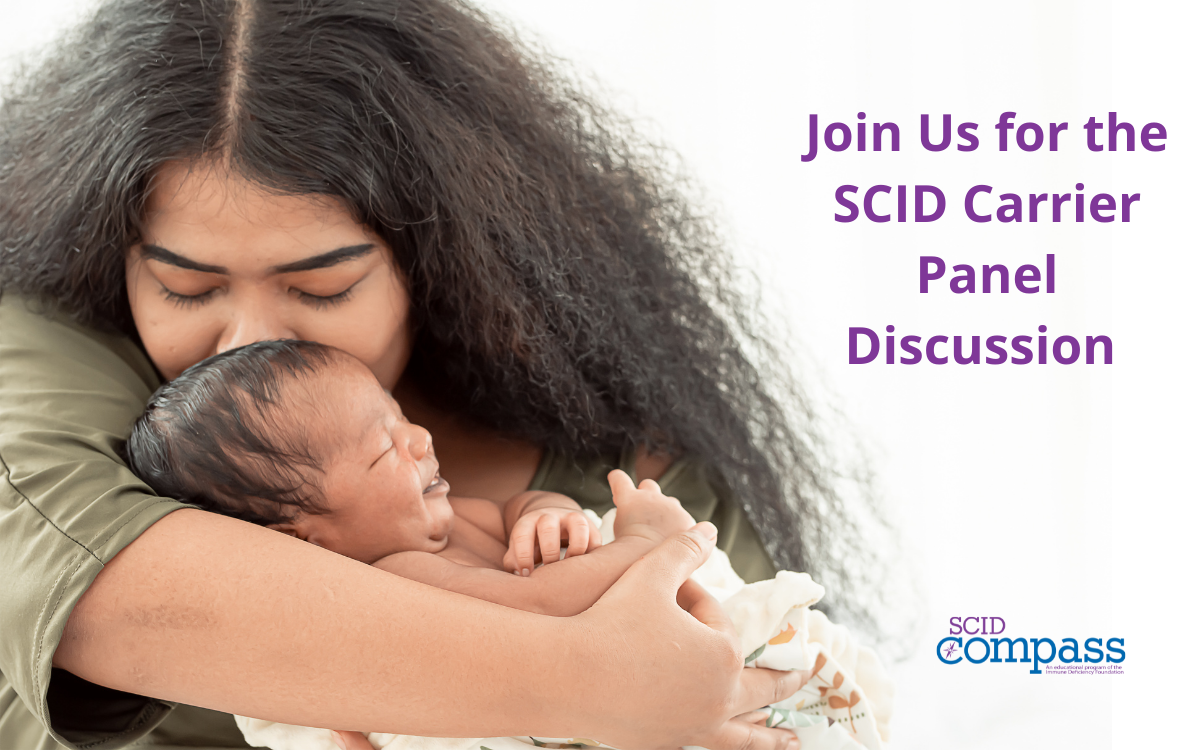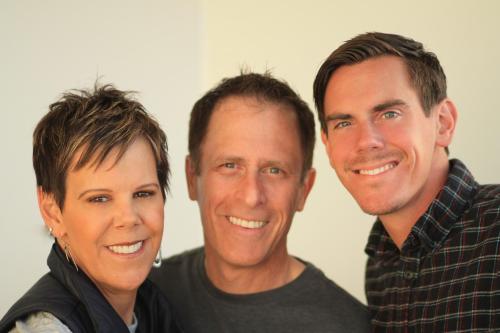
-
Understanding primary immunodeficiency (PI)

Understanding PI
The more you understand about primary immunodeficiency (PI), the better you can live with the disease or support others in your life with PI. Learn more about PI, including the various diagnoses and treatment options.
-
Living with PI
-
Addressing mental health
-
Explaining your diagnosis
- General care
- Get support
- For parents and guardians
-
Managing workplace issues
- Navigating insurance
-
Traveling safely

Living with PI
Living with primary immunodeficiency (PI) can be challenging, but you’re not alone—many people with PI lead full and active lives. With the right support and resources, you can, too.
-
Addressing mental health
-
Get involved

Get involved
Be a hero for those with PI. Change lives by promoting primary immunodeficiency (PI) awareness and taking action in your community through advocacy, donating, volunteering, or fundraising.
-
Advancing research and clinical care
-
Research Grant Program
-
Consulting immunologist
-
Diagnosing PI
-
Getting prior authorization
-
Clinician education
-
Survey research
-
Participating in clinical trials

Advancing research and clinical care
Whether you’re a clinician, researcher, or an individual with primary immunodeficiency (PI), IDF has resources to help you advance the field. Get details on surveys, grants, and clinical trials.
-
Research Grant Program
A few months after Audrey Duggan’s infant son Dean recovered from a bone marrow transplant (BMT) for severe combined immunodeficiency (SCID), she contemplated how to continue building her family.

A carrier of X-linked SCID, Duggan knew she didn’t want to pass the SCID gene variant to another son or daughter through natural conception, so she considered adoption and in vitro fertilization (IVF) as options. When she confided her thoughts to friends and family, they told her to hold off making any decisions until Dean got older.
Not content with their responses, Duggan consulted a therapist who listened to her feelings of anxiety around family planning and encouraged her to follow up with a genetic counseling appointment and to schedule a consultation at an IVF clinic.
“It felt like two very separate diagnoses – (Dean’s) own and my own and I felt like I’d just been ignoring it, and so it became important mentally for me to address it and get the information, which, I think, really ended up helping me, in the long run,” said Duggan, a panelist in the April 6, “SCID Compass Panel: A Carrier’s Perspective.”
The therapist also gave Duggan advice on how to deal with well-meaning loved ones.
“I just had to understand that they didn’t experience what I had experienced so any opinion, or thought, or question, of ‘Oh well, maybe you’ll change your mind,’ it comes from a place where they haven’t had the experience and that’s an incredible privilege.
“And I just remind myself that being able to have an opinion about something is really nice. Having to actually experience it first-hand and make the hard choices and actually figure this out — it’s not a hypothetical, this is like an actual decision — that kind of helped me if anything ever bothered me, just to let it roll off my back.”
“You don’t ever get someone’s decisions until you’re in their shoes, and for this specific topic especially, the answer is different for every person. There is no right answer. It was tough and having the therapist instead of friends or anyone else, was really nice.”
“SCID Compass: A Carrier’s Perspective,” is a discussion between four women affected by SCID, one of whom has SCID, and three mothers of children with SCID who are carriers of a SCID gene variant.
Part of the SCID Compass Lunch & Learn series, the discussion is moderated by Heather Smith, who is a mother of two children with X-linked SCID, president and co-founder of SCID Angels for Life, chairperson of the SCID Compass Steering Committee and the SCID Compass Parent and Patient Advisory Committee, and Immune Deficiency Foundation volunteer for 24 years. Discussion participants include Audrey Duggan, mother of a toddler with X-linked SCID; Caroline Nachem, mother of a school-age daughter with ADA-SCID and a son; and Cindy Kisik, an adult with SCID.
Panel members shared how they learned about their carrier status, and how addressing their mental health needs helped them cope with challenges related to a SCID diagnosis, such as medical trauma and family planning decisions.
Nachem said she and her husband Jeff received their diagnoses as carriers at about the same time that their daughter Eliana received her SCID diagnosis as a three-month-old in the hospital.
“Once we got the answer, it was a relief because we finally knew what the cause was for everything that was happening with our daughter, and now that we had the results, we could go ahead and pursue treatment and try to get her better, whereas the first three months of her life, we were all just scratching our heads trying to figure it all out,” said Nachem. “So, it was not the diagnosis that parents want but it was certainly a relief.”
When Dean Duggan’s newborn screening pointed to possible SCID, doctors admitted him into the neonatal intensive care unit. As doctors performed confirmatory testing on Dean, they also ran bloodwork on Audrey and her husband, TJ. Two weeks later, providers called Duggan and told her that Dean had X-linked SCID and that she was a carrier, which came as a complete surprise because of the lack of family history of SCID.
“It was a lot to process. I’m not sure that I initially gave much thought to myself being a carrier. I think there is the immediate ‘Oh, man, that might cause me some problems,’ but I was so focused on what I was going to do with my son that it was on the address-later list at that time,” said Duggan.
Kisik experienced a relatively late ADA-SCID diagnosis at age 4 and underwent gene therapy treatment in 1991. Kisik said that health challenges prevent her from becoming a birthmother but that she is considering alternatives.
“(Family planning) has been the biggest mountain we have had to go over at this point. We have come to realize that my body is not going to have children, and this is from a lot of the procedures and things like that, so now it was up to my husband and me to try and figure out what we’re going to do instead, and we thought, ‘Why don’t we try adoption?’” said Kisik.
“We’re looking into fostering. We’re looking into adopting. We have ‘fur children’, and they need us at all times, so that’s what has been keeping us going at this point. But I realize that it’s not the end of the world not to have a family if that’s not in the cards for me.”
Kisik said she is a strong proponent of supporting mental health. She received therapy as a child, but the assistance didn’t really help until her teen years when she found a therapist that fit her needs.
“The biggest part that made it so hard for me is that nobody got it. Nobody understood,” said Kisik of her diagnosis. “… It wasn’t until I was 14 or 15 when I realized that it was totally OK to talk to someone and it’s OK to find someone that works for you.”
Though she’s struggled with her mental health over the years, Kisik said she is managing well today with her support system.
“I work in the mental health community. I understand the importance of spreading awareness of mental health. It’s OK to talk about it, as early as possible. As we tell our kids, sometimes this stuff happens but luckily there are things we can do about it now,” said Kisik.
“I have a psychologist. I have a psychiatrist. So that helps me stay even keel. But there are a lot of mental health disorders that I don’t know if they came with the SCID.”
Nachem said she sought therapy after she didn’t want to leave her house or spend time around other people to avert illness and protect her daughter. The therapy seemed to help, she said, but once her daughter entered preschool, her “germaphobia” became more severe, despite doctors telling her that she had to relax some of her protective conditions. One night (pre-COVID), she found herself washing her hands for two hours straight instead of putting her children to bed.
“I knew that’s not OK, that’s not normal. There’s no reason to wash my hands for two hours and so the very next day I made an appointment with a physician to put me on anti-anxiety and anti-depressants and I also asked for a recommendation to a therapist…,” said Nachem.
“It certainly helped a lot. It’s been three years now. I’m still taking the same medication and I did stop seeing the therapist because my life seems to be going pretty well now, and I’m certainly not washing my hands for two hours, though that could happen again.
“I’m certainly not ashamed I’m on anti-depressants and anti-anxiety meds because it’s helped me have a relatively normal life where I can send my kids to public school, they can be around kids that are sneezing, and I could allow that to happen where I don’t freak out about it.
“Certainly, if there’s something going on with your family, go seek help; however, that may be because things can usually get better.”
The women agreed that in addition to therapy, self-care is essential to maintaining mental health. Duggan said a nice shower, a face mask, and just a little time to herself help her feel better. Kisik likes to weightlift, hike outdoors, and spend time with family and friends looking at photos or watching Disney movies. Routine is also important, said Kisik.
“I realize when I don’t have my routine, I feel like I’m in disarray. That consistency helps me stay focused and calm,” she said.
Listen to “SCID Compass Panel: A Carrier’s Perspective.”
____________________________________________________________________________________________________________________
When a woman learns her baby is diagnosed with severe combined immunodeficiency (SCID), she must process the news that her child has a life-threatening primary immunodeficiency (PI) – and also that the child may have inherited it from her.

In most cases, SCID is passed down through genes. In some cases of SCID, a male child can be born with SCID because he inherited the gene that causes SCID from his mother. The mother carries a single mutated copy of the gene, but she does not have SCID herself. This type of SCID is called X-linked. In other cases of SCID, a female or male child can be born with SCID because he or she inherited a gene for SCID from both their mother and father, neither of whom exhibit symptoms but are carriers. These forms of SCID are called autosomal recessive and Adenosine Deaminase (ADA)-SCID is one type.
The emotional weight of the information can be overwhelming for mothers who are carriers and for females diagnosed with SCID.
To address concerns related to the subject of what it’s like to be a carrier of SCID, the SCID Compass program has scheduled the forum, “SCID Compass Panel: A Carrier’s Perspective,” a discussion set for Wednesday, April 6 from 7 to 8 p.m. ET.
The panel features three women who are mothers of children with SCID and one woman who is diagnosed with SCID. Participants include:
- Heather Smith – Smith is the mother of two boys born with X-linked SCID, and the president and co-founder of SCID, Angels for Life, a non-profit that aids families of children diagnosed with SCID, created in recognition of Smith’s first son who passed away from SCID and in honor of her second son living with SCID. A volunteer with the Immune Deficiency Foundation for more than 24 years, Smith currently chairs the SCID Compass Steering Committee and Patient Advisory Board. She is also the SCID patient advocacy group representative for the Primary Immune Deficiency Treatment Consortium (PIDTC) and she sat on the Florida Genetics and Newborn Screening Advisory Council for eight years.
- Audrey Duggan – Duggan is the mother of a 3-year-old born with X-linked SCID and she is a member of the SCID Compass Steering Committee and Parent Advisory Board. She is employed full-time as an internal audit manager in the healthcare field.
- Caroline Nachem – Nachem is the mother of a daughter diagnosed with ADA-SCID and a son. She worked as a stay-at-home for several years after her daughter was born and is now a paraprofessional at an elementary school.
- Cynthia Cutshall-Kisik – Cutshall-Kisik is an adult diagnosed with ADA-SCID in 1984. She was one of the first people to be treated with enzyme replacement therapy for ADA-SCID and was the second person in the world to undergo gene therapy for SCID in 1991. She is an active member of the SCID community and is an occupational therapy assistant in the pediatric field.
Topics the panel intends to cover include how being a carrier affects mental health, family dynamics in conversations about family planning, and the importance of self-care.
“I think this will be an informative discussion where a SCID adult patient and SCID adult carriers will openly discuss how being a female patient with SCID or a female carrier of SCID has affected their lives and their decisions to have children, their mental health, and even their own self-care,” said Smith. “It’s always useful to hear the perspectives of other adult SCID carriers and patients, especially when it comes to these topics.”
Smith said she hopes carriers of SCID and adults with SCID will benefit from connecting to a network of persons who have similar experiences.
“Who better to learn from than the patients and carriers themselves? As a community, we need to know what else we can do to help support SCID carriers, not only for ourselves but for future generations to come,” said Smith.
Sign up for updates from IDF
Receive news and helpful resources to your cell phone or inbox. You can change or cancel your subscription at any time.





The Immune Deficiency Foundation improves the diagnosis, treatment, and quality of life for every person affected by primary immunodeficiency.
We foster a community that is connected, engaged, and empowered through advocacy, education, and research.
Combined Charity Campaign | CFC# 66309




